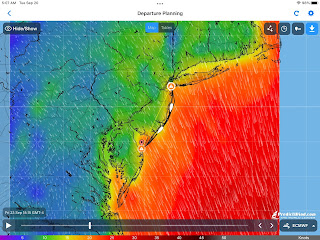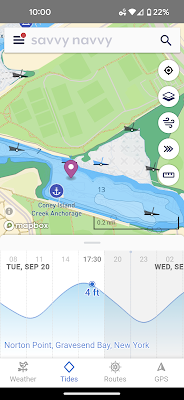The goal for every sailing day is good wind, minimal swell, cooperative tide and current. There's a lot that goes into passage planning to make all of this come together.
The first step is to pick your route. In this case, we are jumping around the outside of New Jersey, heading South in the open Atlantic. Our route will take us against the generally prevailing swell and wind, so we are looking for that rare window when the swell is minimal and the wind comes from anything other than its usual direction.
Our first intent was to leave on Friday, because it had a speedy tailwind. We would be truly flying! Our friend Al told us last night he wants to leave on Tuesday (today). Let's compare the days.
 |
| Wind: this is Predictwind's Friday routes. The second boat which represents a noon departure would have 20-25 knot broad reach winds most of the day. |
We use a variety of tools for planning. We usually start with Windy.com to get an overview of generally what the wind and rain are planning. In this case there is a high pressure over New York which is rejecting the approach of the offshore hurricane Fiona. On Friday the remnants of a storm currently hitting California will arrive here, bringing strong winds from the NorthWest.
The latest addition to our toolbox is PredictWind. It took us some time to set it up with the tolerances of Minerva and her crew, and like any new tool the more energy we invest in it the better we can make it work for us. With the weather routing enabled, we can find the best travel windows.
Then it's back to Windy to check the swell. It's no fun beating into big waves. PredictWind may have a swell overlay as well, I haven't explored that yet.
 |
| Friday's swells as seen on Windy. Ugly. |
 |
| Tuesday's swells. Minimal. |
Now that we've compared the two days, it's clear that Tuesday is the better choice. While we won't be sailing as fast, we also won't be banging into 2-3 meter waves. We may have to motor for a little while in the middle of the trip, or we may be able to sail it all with the light spinnaker. Worth it to take less of a beating.
Lastly, we pull up Savvy Navvy to check the tides and currents. Sometimes we have a skinny water exit from our overnight anchorage. If we can't get out of the harbor to meet our window, we need to move the boat for better staging or start all over again with a new window that lets us escape on time. In this case there are no worries.
Lastly, plug the route into the chartplotter, and we're off!
This will be our longest single passage ever and we are quite excited about it.
Just in case the weather predictions are all wrong we picked a bailout point at Atlantic City. We've been to both our destination in the Delaware River and also Atlantic City before and we are comfortable arriving to either place at night.
See you on the other side!

